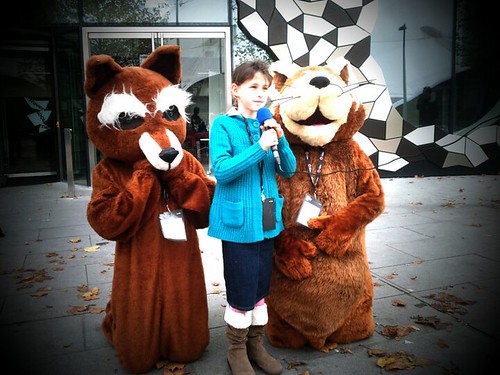
_Image by Peter Bihr, Creative Commons (by-nc-sa)_
Mozilla Festival (aka #Mozfest) is over, and it was intense. Throw a mix of 500 journalists, hackers, web devs and activists in a room and shake it up, and interesting things are going to happen. As well they did.
There’s plenty of good reviews out there, so I’m just going to highlight a few points that stood out for me.
Education for the open web
Ben Hammersley, who among many other things advises the EU in digital matters, made a point about the importance of education: Those who decide upon the future don’t understand the present.
We have several digital gaps in education – education in all things digital, about all things digital, across all things digital. One, there’s a gap along education lines. Two, there’s a global divide. Three, there’s a gap along income (and education) of parents that prevents kids in poorer neighborhoods the same chances to participate online (which might enable them to bootstrap knowledge).
And then we have – four! – a gap between those who by belonging to the group that really gets the web and how it works and those who don’t, where politicians are mostly on the wrong side of the gap. It’s a structural divide more than anything – give it a few years and things might work out fine, but as it stands (repeat!) Those who decide upon the future don’t understand the present. And this is something we need to work on. Luckily, it’s easier to educate some smart folks than change whole strata of society. (At least in theory.)
This is where we all can come in and help out. If you find yourself talking to a politician, help them out. Take the time to explain stuff. Don’t be snobby about it. It’s politics where we can leverage power, and it’s politics where the foundation is laid for how our most important infrastructure will work (or be broken) for years.
Let’s all work on some truly relevant things.
Image by Pierros Papadeas, some rights reserved
Data Journalism Handbook
Just a brief shout out: A large group of journalists and data diggers gathered and wrote a Data Journalism Handbook. It’s not finished, but it’s an impressive draft and a great basis to extend over time. They just dug in, and built something cool over the weekend, then took it from there. This is the way to go, really.
Popcorn – making your videos talk to the web (and the web talk back)
The real killer – a real eye opener! – for me was certainly Popcorn.js, or rather the Popcorn Maker. Popcorn.js is a framework to make video on the web more interactive – more of the web – an event framework, or in other words: a little toolkit that helps you make your videos interact with the websites around them and vice versa. For example, you can pull maps or Flickr images or a live Twitter search into your video, or into an adjacent box (or pretty much wherever you like, really).
It’s harder to explain than to understand, so here’s a Popcorn demo.
And the Popcorn Maker, launched last Friday, is a web-based authoring tool to make all this more accessibel to non-developers – you need only the most basic understanding of HTML etc to use a video you uploaded to Youtube or Vimeo and enrich it with web data.
It’s super impressive, and it’s great how this has come about since last year‘s Mozilla Festival in Barcelona.
It’s also very clearly alpha software at the time, so try at your own risk – in a first test, I wasn’t able to save a project, but could pull a Youtube video and add map data, photos and tweets within less than 5 minutes – it’s really quite something.
Standards for space, time and the web
Every morning, I went for a run. Since my hotel was close by, my run would take me around the Royal Observatory. At the Observatory there are a number of mindboggingly interesting things on display: The Prime Meridian, the original kilogram, a measurement of feet and inches (to compare with your local merchant), as well as the (probably) first clock to display Greenwich Mean Time to the public (since 1852). There’s also a red ball on one of the rooftops that every day would be pulled up slowly, then drop at exactly 13:00h every day. The ball was visible from the river Thames, allowing the ships to reset (and thus synchronize) their clocks.
The Royal Observatory was by and large the center of standardization for most of the world. From here, standards of space and time would ripple and spread throughout the Commonwealth.
It’s a bit like what the W3C is for the internet today. And like we needed to agree on standards for space and time 150 years ago, we need to agree on standards for the web today. The more open they are – the more they allow us to look inside the box, and tinker, and exchange data, and the more anybody can use and contribute to them – the better off all of us will be.

